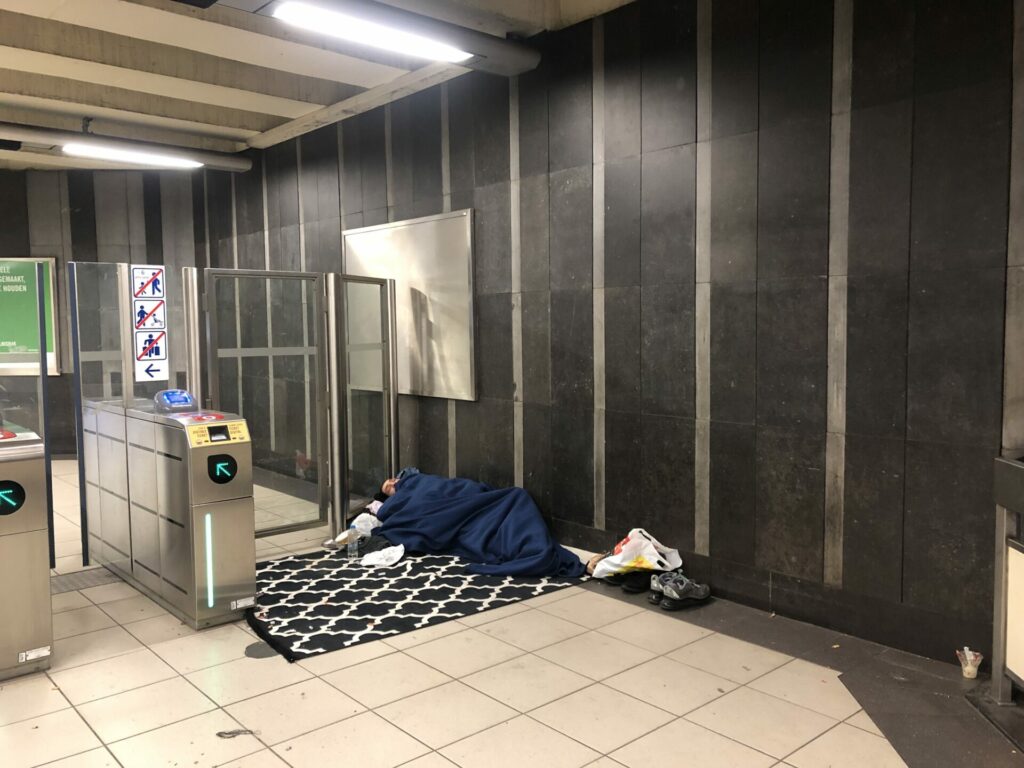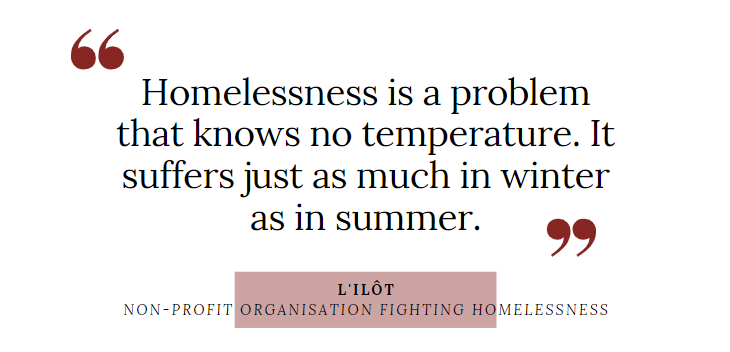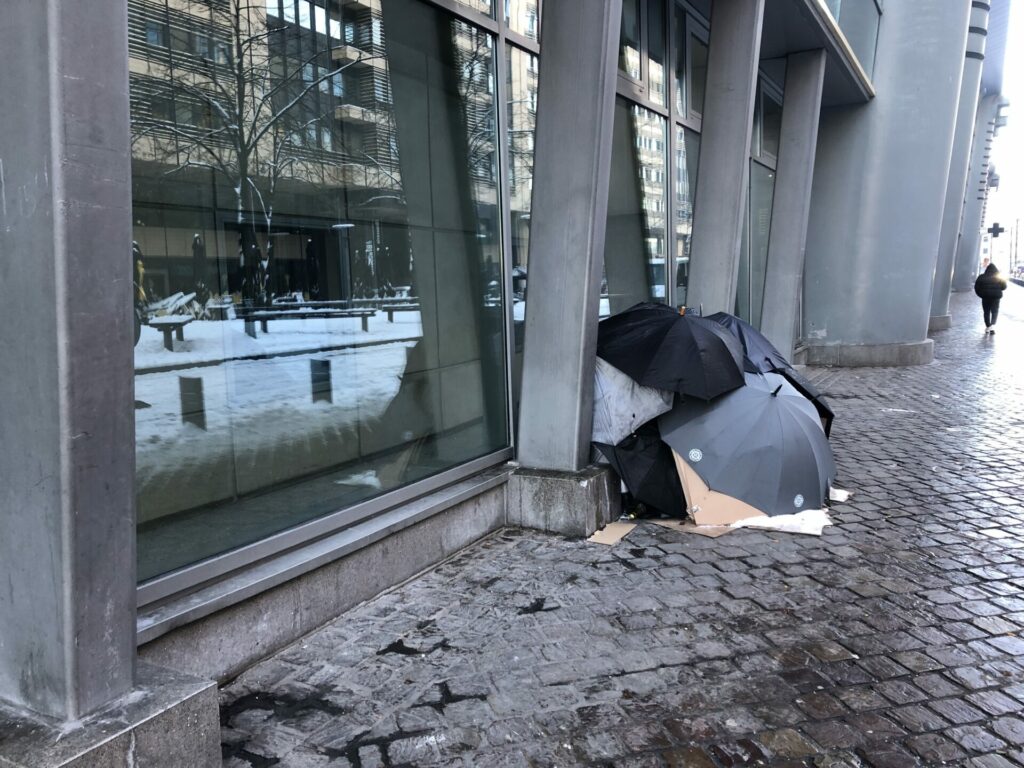Homelessness is a problem clear to see in Brussels all year round, but one that becomes all the more pressing when temperatures hit freezing. The Brussels authorities have now activated the 'Extreme Cold' plan, but what happens after that?
Sleeping bags, cardboard mattresses and blankets are piled in the corners of the Comte de Flandre metro station near the Petit Chateau refugee reception centre. Despite the emergency places added in accommodation centres, many people are still sleeping in the Brussels metro network.
"I have been sleeping here for a while," Rashad, a man in his thirties and one of the thousands of homeless people living in the capital, told The Brussels Times. "I tried to get into several shelters a few nights last week, but they were all already full. They always give priority to families with children. But that is good, children should not live like this."

Homeless man in Comte de Flandre metro station. Credit: The Brussels Times
For the past few days, he has been sleeping in metro stations. "Someone told me that the authorities are not allowed to kick me out now that it is so cold. I don't know if that is true, but no one has sent me away yet."
Indeed, in addition to opening an area of the Brussels Midi station during freezing nights, the 'Extreme Cold' plan also means that Brussels' public transport operator STIB is allowing homeless people to remain in the (non-paying) public areas of their stations, including at night.
Under the plan, the Brussels-Capital Region created 155 extra places for homeless and poorly-housed people. Last week, this was scaled up to a total of 263 emergency places on top of the 5,000 in the regular shelter system.
Of those, 208 places are for single men within the Red Cross and Samusocial centres, and 55 places for women and families within the Samusocial and Ukrainian Voices structures, Eva Salman of Bruss'help told The Brussels Times. Still, this is insufficient for the estimated 7,000 homeless people in the Capital Region.
Homelessness knows no temperature
Many of them are also asylum seekers who have not received the shelter to which they are legally entitled. Now, dozens of them are crammed together at 'Passage 44' next to the Immigration Office, where they live and sleep without access to sanitary facilities, food or drink.
"There are a number of Sudanese men there who are no longer even looking for a lawyer because they know that it will not help. They just live in small squats here and there to stay under the radar," Marie Doutrepont of the Progressive Lawyers Network representing asylum seekers told The Brussels Times, adding that 2,700 asylum seekers are still waiting for reception.
While the l'Ilôt organisation fighting homelessness welcomes any initiative that takes people off the streets, they also called the plan "no more than a plaster on a bullet hole" that does not tackle the underlying issues and only focuses on symptom relief. "Homelessness is a problem that knows no temperature. It hurts just as much in winter as in summer: as many people die on the streets in summer as in winter."
The sudden drop in temperatures serves only to highlight a year-round problem: the shelters are almost always at capacity. "The real solution is not to constantly increase the number of places but rather to move towards long-term solutions based on getting people back into housing."
The organisation's head of advocacy, Benjamin Peltier, likened the situation to an ocean liner that constantly loses people overboard but whose crew only hands out lifevests when the sea gets rough. "That doesn't get anyone back on board and it certainly doesn't prevent people from falling off."
The striking lack of preparation for winter is "worrying, at the least. These weather conditions occur annually. Every year, we face the same problems," said Brussels MP Els Rochette (vooruit.brussels), stressing the need for structural solutions "not only during winter but all year round. Even in 'warmer' months it is degrading to have to sleep on the street."
Help organisations have been saying for years that a number of 'Housing First' measures need to be deployed urgently to bring about structural change. This would be a policy to provide permanent housing for homeless people as soon as possible. Alongside personalised counselling, this would structurally tackle possible trauma, drug and health problems.
Related News
- Homeless man found dead in Ixelles did not die of hypothermia, autopsy shows
- 'A plaster on a bullet hole': Brussels activates Extreme Cold plan for homeless people
- Extreme cold: Red Cross emergency centre in Anderlecht to add more beds
"It is almost better with the cold: more organisations are coming around to check on us or to hand out coffee and hot soup or socks and blankets," said Ana, a young homeless woman seeking refuge from the cold in the Comte de Flandre metro station.
The 'Extreme Cold' plan will remain in place until 8 February. At that point, an assessment will determine whether or not the plan will be extended. Without an extension, the system will return to its normal operation: approximately 5,045 places in the entire reception system, plus the 150 'Winter' places open until April.
"Because of these extra spaces, I have been able to get into a shelter most nights," said Ana. "But when they close the emergency spaces again, I don't know what I'll do."

